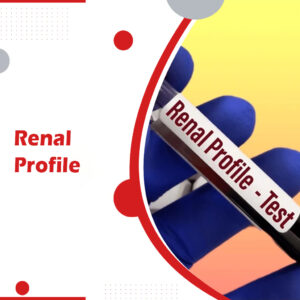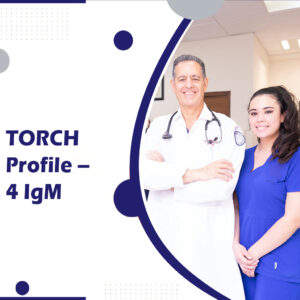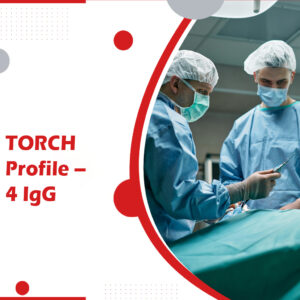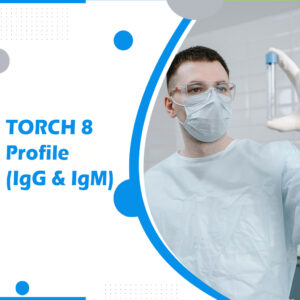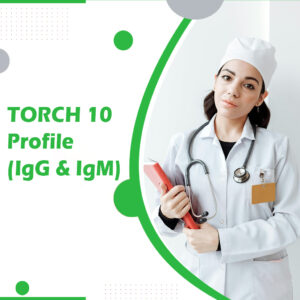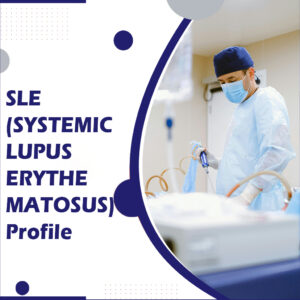Thyroid
Thyroid Tests / Packages

Types of Thyroid problems
- Hyperthyroidism: When the thyroid produces too much hormone. Its also called overactive thyroid.
- Hypothyroidism: When the thyroid doesn’t produce enough hormone. Its also called underactive thyroid.
- Thyroid Cancer: When some of the thyroid cells become cancerous.
- Goiter: An unusually enlarged thyroid gland. Usually, the only symptom of a goiter is a swelling in the neck. A very large goiter can also cause a tight feeling in the throat, coughing, problems swallowing or breathing.
- Thyroid Nodules: A condition called toxic nodular goiter or multinodular goiter. Thyroid nodules are growths that form on or in the thyroid gland and can cause the thyroid gland to overproduce hormones.
- Thyroiditis: An inflammation of the thyroid gland and may be associated with either hypothyroidism or hyperthyroidism. Thyroiditis may be due to an autoimmune disorder (especially Hashimoto thyroiditis), an infection, exposure to a chemical that is toxic to the thyroid, or due to an unknown cause (idiopathic).
How do thyroid problems affect women?
- Problems with the menstrual period: The thyroid helps control the menstrual cycle. Hyperthyroidism or Hypothyroidism can make periods very light, heavy, or irregular. Thyroid disease can cause periods to stop for several months or longer, a condition called amenorrhea and can also lead to early menopause (before age 40).
- Problems getting pregnant
When thyroid disease affects the menstrual cycle, it also affects ovulation making it harder to conceive. - Problems during pregnancy
Thyroid problems during pregnancy can cause health problems for the mother and the baby.
Causes of Hypothyroidism?
- Problems with the menstrual period: The thyroid helps control the menstrual cycle. Hyperthyroidism or Hypothyroidism can make periods very light, heavy, or irregular. Thyroid disease can cause periods to stop for several months or longer, a condition called amenorrhea and can also lead to early menopause (before age 40).
- Problems getting pregnant
When thyroid disease affects the menstrual cycle, it also affects ovulation making it harder to conceive. - Problems during pregnancy
Thyroid problems during pregnancy can cause health problems for the mother and the baby.
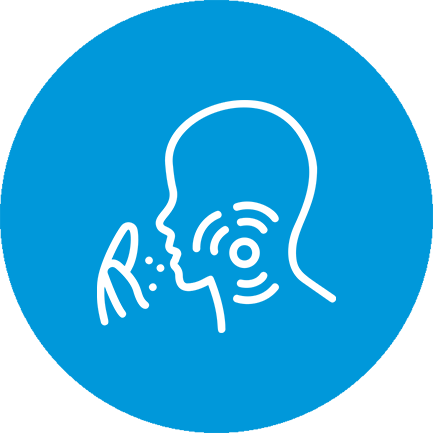
Tuberculosis (TB)

Congenital defects
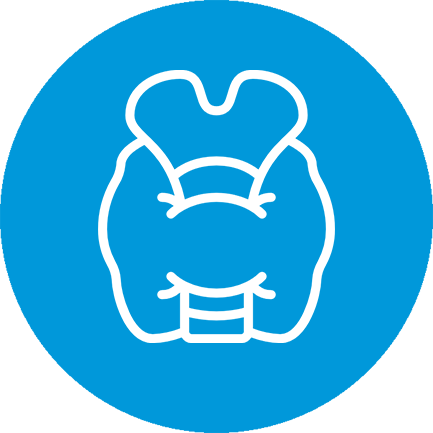
Removal of the thyroid gland
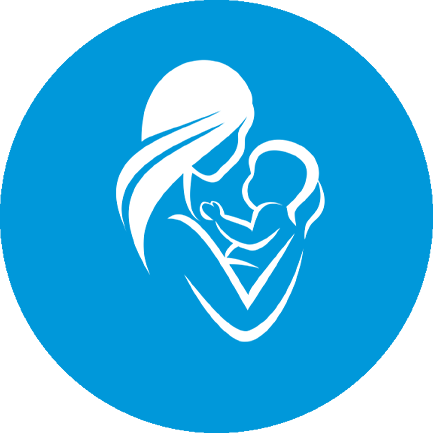
Postpartum thyroiditis
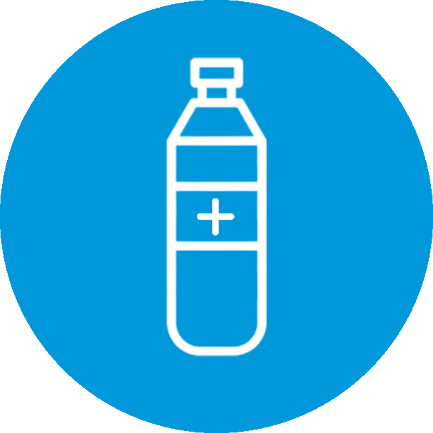
Postpartum thyroiditis

Postpartum thyroiditis
- Hashimoto’s thyroiditis: The most common cause of hypothyroidism. The disease occurs when the body’s immune system mistakenly attacks and slowly destroys the thyroid gland and its ability to produce hormones.
- Postpartum thyroiditis: An inflammation of the thyroid after giving birth, affecting around 10% of women.
- Removal of the thyroid gland: The thyroid may have been surgically removed or chemically destroyed.
- Medications: Few medications, particularly lithium may cause drug-induced hypothyroidism.
- Congenital defects: Hypothyroidism can be present from birth resulting in mental retardation, goitre, and short stature.
- Iodine deficiency: Lack of iodine diminishes the ability of the thyroid gland to make enough thyroid hormone.
The following conditions cause hyperthyroidism:

Graves' disease

Thyroid Nodules

Removal of the thyroid gland

Postpartum thyroiditis
- Graves’ disease: The most common cause of hyperthyroidism. Grave’sdisease is an autoimmune disorder that occurs when the bodys immune system mistakenly attacks the thyroid gland. This can cause the gland to overproduce the hormone responsible for regulating metabolism.
- Thyroid nodules: A condition called toxic nodular goitre or multinodular goitre. Thyroid nodules are growths that form on or in the thyroid gland and can cause the thyroid gland to overproduce hormones.
- Pituitary adenoma: The tumour of the pituitary gland leads to overstimulation of the thyroid gland.
- Subacute thyroiditis: A temporary inflammatory disorder of the thyroid gland resulting in periods of increased thyroid hormone release due to the inflammation.
What are the symptoms of Hypothyroidism?

Weight gain
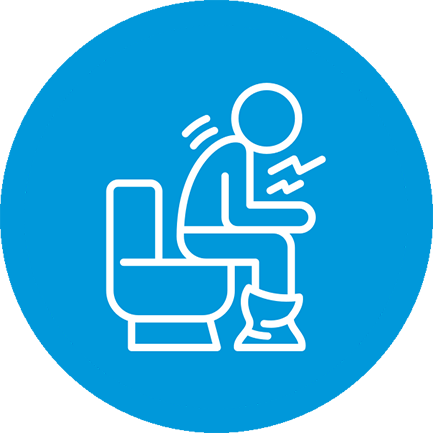
Constipation

Hoarseness
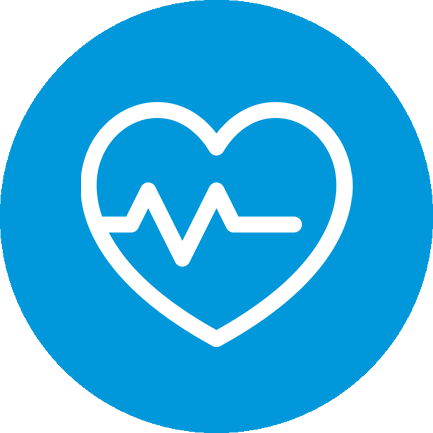
Slowed heart rate

Enlarged thyroid gland (goitre)

Fatigue

Dry skin

Muscle weakness

Depression

Irregular period

Sensitivity to cold
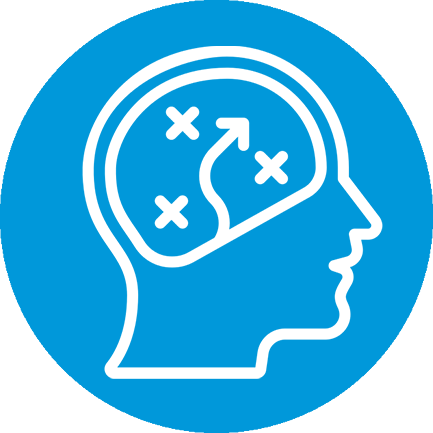
Puffy face

Thinning hair
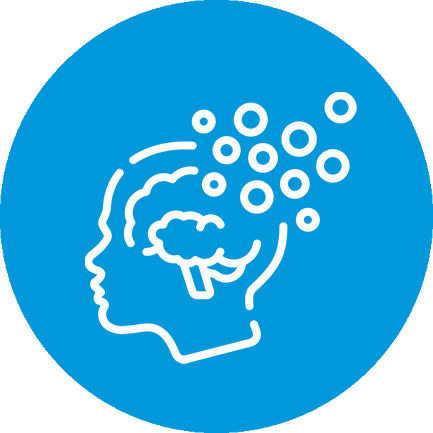
Impaired memory
- Weight gain
- Fatigue
- Increased sensitivity to cold
- Constipation
- Dry skin
- Puffy face
- Hoarseness
- Muscle weakness
- Muscle aches
- Thinning hair
- Slowed heart rate
- Depression
- Impaired memory
- Enlarged thyroid gland (goitre)
- Irregular menstrual periods
Babies with hypothyroidism may have:
- Cold hands and feet
- Constipation
- Extreme sleepiness
- Hoarse cry
- Little or no growth
- Low muscle tone
- Persistent jaundice
- Poor feeding habits
- Puffy face
- Stomach bloating
- Swollen tongue
Children and teens have the same signs and symptoms as adults, but they may also experience:
- Poor growth, resulting in short stature
- Delayed development of permanent teeth
- Delayed puberty
- Poor mental development
What are the symptoms of Hyperthyroidism?
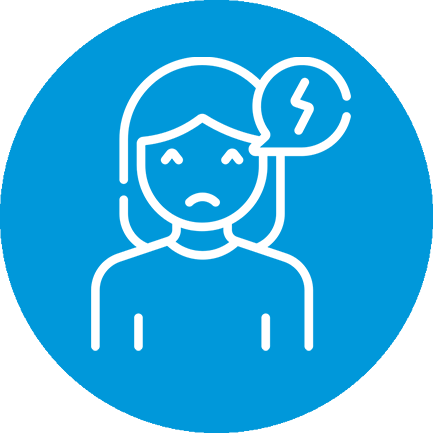
Nervousness

Muscle weakness

Weight gain

Heat Sensitivity

Racing Heart

Irritability

Infrequent, Scant Menstrual Periods

Vision Problems

Infrequent, Scant Menstrual Periods

Enlarged Thyroid Gland
Common symptoms of Hyperthyroidism
- Nervousness
- Irritability
- Muscle weakness
- Infrequent, scant menstrual periods
- Weight loss
- Trouble sleeping
- Enlarged thyroid gland
- Vision problems
- Heat sensitivity
- Racing heart
How is Thyroid disease diagnosed?
Early diagnosis and treatment of thyroid disease is crucial. Doctors may order one or more blood tests to check thyroid function.
- TSH (Thyroid Stimulating Hormone)
This test measures the amount of TSH (Thyroid-stimulating hormone) in the blood. TSH stimulates the thyroid and is produced by the anterior pituitary gland. This test is used to diagnose hypothyroidism, hyperthyroidism, screen newborns for hypothyroidism, and monitor treatment for thyroid disorders. - T4, Free
This test helps to evaluate thyroid gland function and diagnose thyroid disease including hypothyroidism and hyperthyroidism. Free T4 is also used to help diagnose congenital hypothyroidism in newborns.
Almost all of the T4 found in the blood is bound to protein. The rest is free (unbound) and is the biologically active form of the hormone. This test measures the amount of free T4 in the blood. - T3 Free and Total
It helps to evaluate thyroid gland function and diagnose thyroid diseases including hyperthyroidism. It also helps to monitor the effectiveness of treatment of a thyroid disorder.
Almost all of the T3 found in the blood is bound to protein. The rest is free (unbound) and is the biologically active form of the hormone. This test measures the amount of free T3 and total T3 (bound plus unbound) in the blood. - Thyroid Antibodies
This test measures the level of thyroid antibodies in the blood and helps to diagnose and monitor autoimmune thyroid diseases and to distinguish these from other forms of thyroid disease.
Antibodies are proteins made by the immune system to fight foreign substances like viruses and bacteria. There are different types of thyroid antibodies.
Thyroid peroxidase (TPO) antibodies: These antibodies can be a sign of Hashimoto thyroiditis or Graves’ disease.
Thyroglobulin antibodies (Tg): These antibodies can also be a sign of both Graves’ disease and Hashimoto thyroiditis. Most people with Hashimoto thyroiditis have high levels of both Tg and TPO antibodies.
Thyroid-stimulating hormone receptor antibodies (TSHR): These antibodies can be a sign of Graves’ disease.
- Thyroglobulin
This test measures the amount of thyroglobulin, a protein produced by the thyroid gland, in the blood. This test is used to monitor the treatment of thyroid cancer and to detect recurrence.
Non-Laboratory Tests
- Thyroid scans A specialised imaging procedure to diagnose thyroid gland abnormalities and to evaluate thyroid function in different areas of the thyroid.
- Ultrasound An imaging scan that is used to examine the thyroid for abnormalities, including cysts, nodules or tumours.
What is Thyroid?
Thyroid is a small, butterfly-shaped gland located in the neck, which plays a crucial role in regulating the body’s metabolism. It produces hormones that influence various processes, including energy production and temperature regulation. The two primary hormones produced by the thyroid gland are triiodothyronine (T3) and thyroxine (T4).
What are The Functions of Thyroid Gland?
The thyroid gland performs several important functions in the body:
- Hormone Production: The thyroid gland produces hormones, primarily thyroxine (T4) and triiodothyronine (T3), which play a crucial role in regulating the body’s metabolism.
- Metabolic Regulation: Control the rate at which the body converts food into energy (metabolism).
- Temperature Regulation: Help regulate body temperature by influencing heat production and heat dissipation.
- Heart Rate and Blood Pressure: Impacts heart rate and blood pressure, contributing to the cardiovascular system’s proper functioning.
- Brain Development: Essential for the development of the fetal brain during pregnancy and continuing to support brain function throughout life.
- Muscle Control: Play a role in maintaining muscle control and strength.
- Cholesterol Levels: Help regulate cholesterol levels in the blood.
What are Thyroid Disorders?
Thyroid disorders refer to conditions that affect the thyroid gland.
There are several types of thyroid disorders, including:
- Hypothyroidism: This occurs when the thyroid gland doesn’t produce enough thyroid hormones.
- Hyperthyroidism: This condition results from an overproduction of thyroid hormones.
- Thyroid Nodules: These are lumps or abnormal growths in the thyroid gland. While most thyroid nodules are non-cancerous (benign), some may be cancerous.
- Thyroiditis: Inflammation of the thyroid gland is referred to as thyroiditis. It can be caused by infections, autoimmune conditions, or other factors.
What are The Causes of Thyroid Disorders?
There are two main types of thyroid problems: hypothyroidism and hyperthyroidism. These happen when the thyroid gland, which produces hormones for the body, doesn’t work properly. Here are some reasons for each:
Hypothyroidism Causes
- Thyroiditis: Swelling of the thyroid gland that reduces hormone production.
- Hashimoto’s Thyroiditis: Body’s cells mistakenly attack the thyroid, usually inherited.
- Postpartum Thyroiditis: Temporary condition after childbirth, affecting 5% to 9% of women.
- Iodine Deficiency: Lack of iodine, necessary for thyroid hormone production.
- Non-functioning Thyroid Gland: Some people are born with a thyroid that doesn’t work correctly, affecting 1 in 4,000 newborns.
Hyperthyroidism Causes
- Graves’ Disease: Overactivity of the entire thyroid gland.
- Nodules: Overactive nodules within the thyroid; a single one is called toxic autonomously functioning thyroid nodule.
- Thyroiditis: Inflammation causing the release of stored hormones, lasting weeks or months.
- Excessive Iodine: Too much iodine in the body leads to excess thyroid hormone production. Found in some medications and cough syrups.
What are The Symptoms of Thyroid Disorders?
There are two main types of thyroid disorders:
- Hypothyroidism: It occurs when the thyroid gland is underactive, leading to insufficient production of thyroid hormones (T3 and T4).
Symptoms of Hypothyroidism
The symptoms of Hypothyroidism (Underactive Thyroid) include:
- Tiredness
- More sensitivity to cold
- Constipation
- Dry skin
- Weight gain
- Puffy face
- Hoarse voice
- Coarse hair and skin
- Muscle weakness
- Muscle aches, tenderness and stiffness
- Irregular Menstrual cycles
- Thinning hair
- Slowed heart rate, also called bradycardia
- Depression
- Memory problems
2. Hyperthyroidism: It is characterized by an overactive thyroid gland, leading to an excess of thyroid hormones.
Symptoms of Hyperthyroidism
The symptoms of Hyperthyroidism (Overactive Thyroid) include:
- Losing weight without trying
- Fast heartbeat (tachycardia)
- Irregular heartbeat (arrhythmia)
- Heart palpitations
- Increased hunger
- Nervousness, anxiety and irritability
- Trembling in the hands and fingers
- Sweating
- Changes in menstrual cycles
- Increased sensitivity to heat
- Enlarged thyroid gland, sometimes called a goiter
- Tiredness
- Muscle weakness
- Sleep problems
- Warm, moist skin
- Thinning skin
- Fine, brittle hair
What Tests are Done to Diagnose Thyroid Disorders?
Thyroid blood tests measure certain hormones and antibodies in your blood. Too many or too few of these hormones or antibodies might mean that you have thyroid disease.
Type of Thyroid Blood Tests:
1. Thyroid-stimulating Hormone (TSH): Pituitary gland (part of your brain) makes TSH. It travels to the thyroid gland, stimulating it to produce thyroid hormones, T3 and T4.
A high TSH level most often means a person has hypothyroidism, or an underactive thyroid.
A low TSH level usually means you have hyperthyroidism, or an overactive thyroid. This means that the thyroid is making too much hormone, so the pituitary gland stops making and releasing TSH into the blood.
2. Triiodothyronine (T3): It measures the amount of triiodothyronine in the blood. This hormone is one of two main hormones that thyroid gland makes. The T3 test checks for levels of the hormone triiodothyronine. It’s usually ordered if T4 tests show elevation.
3. Thyroxine (T4): It measures the amount of thyroxine in the blood. Thyroxine is the other main type of hormone that the thyroid gland makes. A high blood level of T4 may mean that a person has hyperthyroidism. A low level of T4 may mean a person has hypothyroidism.
4. Thyroid Antibody Tests: It gives insights about whether or not there are thyroid antibodies in the blood. The presence of thyroid antibodies might mean a person may have an autoimmune disorder like Graves’ disease or Hashimoto’s disease.
Thyroid gland is a small organ that’s located in the front of the neck, wrapped around the windpipe (trachea). It’s shaped like a butterfly, smaller in the middle with two wide wings that extend around the side of your throat. The thyroid is a gland. You have glands throughout your body, where they create and release substances that help your body do a specific thing. Your thyroid makes hormones that help control many vital functions of your body.
When your thyroid doesn’t work properly, it can impact your entire body. If your body makes too much thyroid hormone, you can develop a condition called hyperthyroidism. If your body makes too little thyroid hormone, it’s called hypothyroidism. Both conditions are serious and need to be treated by your healthcare provider.
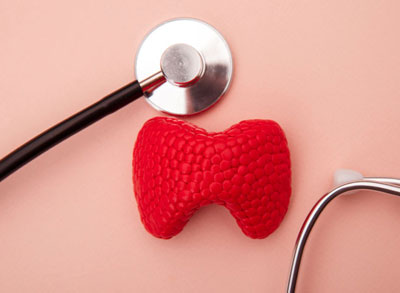
What common symptoms can happen with thyroid disease?
There are a variety of symptoms you could experience if you have a thyroid disease. Unfortunately, symptoms of a thyroid condition are often very similar to the signs of other medical conditions and stages of life. This can make it difficult to know if your symptoms are related to a thyroid issue or something else entirely.
For the most part, the symptoms of thyroid disease can be divided into two groups — those related to having too much thyroid hormone (hyperthyroidism) and those related to having too little thyroid hormone (hypothyroidism).
Symptoms of an overactive thyroid (hyperthyroidism) can include:
- Experiencing anxiety, irritability and nervousness.
- Having trouble sleeping.
- Losing weight.
- Having an enlarged thyroid gland or a goiter.
- Having muscle weakness and tremors.
- Experiencing irregular menstrual periods or having your menstrual cycle stop.
- Feeling sensitive to heat.
- Having vision problems or eye irritation.
Symptoms of an underactive thyroid (hypothyroidism) can include:
- Feeling tired (fatigue).
- Gaining weight.
- Experiencing forgetfulness.
- Having frequent and heavy menstrual periods.
- Having dry and coarse hair.
- Having a hoarse voice.
- Experiencing an intolerance to cold temperatures.
Basic Tests
Thyroid-stimulating Hormone (TSH) Blood Test
The Thyroid-stimulating Hormone (TSH) Blood Test checks thyroid gland function.
Thyroid Peroxidase Antibodies (TPO) Blood Test
A TPO Blood Test provides a differential diagnosis of hypothyroidism and thyroiditis.
Thyroxine (T4) Free Direct Serum Test
A T4 Free Direct Serum Test is ordered to help in evaluating thyroid gland function.
Parathyroid Hormone (PTH) Intact Blood Test
A PTH Intact Blood Test diagnoses parathyroid disease and other diseases of calcium homeostasis; monitoring patients undergoing renal dialysis.
Tri-iodothyronine (T3) Free Serum Test
A Free T3 is ordered to evaluate thyroid function.
Thyroid Antibodies Panel Blood Test
The Thyroid Antibodies Panel Blood Test includes a TPO and TAA.
Tri-iodothyronine (T3) Blood Test
The T3 Blood Test is ordered to help in evaluating thyroid gland function and in the diagnosis of hyperthyroidism.
Iodine Blood Test
An iodine blood test monitors exposure to iodine; evaluate for iodine deficiency disorders (IDDs), excessive iodine intake, or iodine in the workplace.
Calcium Ionized Serum Test
The Calcium Ionized Serum Test measures the amount of Ionized Calcium, also known as free calcium, in the blood.
Thyroxine (T4) Blood Test
The Thyroxine Blood Test is a thyroid function test.
Thyroid Antithyroglobulin Antibody (TAA) Blood Test
A Thyroid Antithyroglobulin Antibody (TAA) Blood Test helps diagnose an autoimmune thyroid disease and separate it from other forms of thyroiditis.
Thyroid-stimulating Immunoglobulin (TSI) Blood Test
The TSI Blood Test aids in the diagnosis of autoimmune disorders which affect the Thyroid
Thyroglobulin Antibodies Blood Test
The Thyroglobulin Antibodies Blood Test helps to diagnose autoimmune thyroid disease and separate it from other forms of thyroiditis.
Thyrotropin Receptor Antibody Blood Test
A Thyrotropin Receptor Antibody Blood Test is used in the diagnosis of hyperthyroidism and Graves’ disease.
Prealbumin Blood Test
This Prealbumin Blood Test evaluates protein malnutrition, total parenteral nutrition, and liver dysfunction.
Thyroxine-Binding Globulin (TBG) Serum Test
The TBG Serum Test measures the level of TBG, a protein that moves thyroid hormone throughout your body.
Calcitonin Blood Test
The Calcitonin Blood Test measures the level of hormone calcitonin in the blood
Parathyroid Hormone-related Peptide (PTH-rP) (Endocr…
The PTH-rP is used to aid in the evaluation of unexplained hypercalcemia, particularly in suspected hypercalcemia of malignancy.



